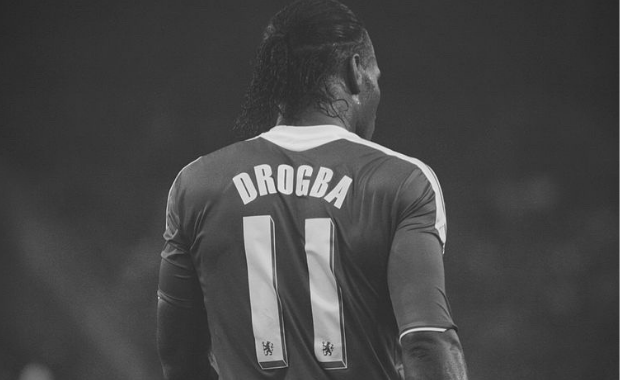Success Advice
4 Characteristics That Made the Legendary Didier Drogba Great

Didier Drogba is a former professional football player from Ivory Coast and is considered one of the greatest ever from Africa. He came to prominence during his time with English Premier League football club, Chelsea FC. Some of his achievements include winning African Footballer of the Year twice and being the all-time leading scorer for his national team.
Winning the Champions League, European football’s most coveted club trophy is probably the most memorable of all his accolades. He was the kind of player that even rival fans respected for the impact he had on the game. Such players are not easily forgotten, and the following are some of the characteristics that made him great.
1. Man for the big moment
Didier has an enviable record of scoring important goals in big games, which became a personal trademark of his. In 10 cup finals, he scored 10 goals that haven’t been matched by many other players. 4 of those came in 4 FA Cup final games, a record he still holds for most goals by a player in a final.
As mentioned earlier, the most memorable of those 10 goals came in the 2012 UEFA Champions League Final against Bayern Munich. What made it so special was that it was his final game as a Chelsea player during his first stint. With two minutes remaining and Chelsea trailing 1-0, he scored a powerful header to level the score.
This forced extra time and Chelsea went on to win on penalties, with Drogba scoring the winning spot-kick. Some of his teammates used to say that he would be a different animal in preparation for big games. It goes to show that he had extra motivation to shine on the big stage.
“When I was young there were a lot of players more talented than me. They had pure talent. But my desire was stronger than their talent” – Didier Drogba
2. Competitive spirit
He certainly wouldn’t have excelled at the level he did without the competitive spirit of a fighter. His upbringing also wasn’t very rosy, and he could have missed out on his great career. Most professional footballers go through an academy in their early years to nurture their talent and potential, which he didn’t.
This was because he never settled in one place in his younger years. The family struggles he had as a young person forced him to move around a lot. By the time he got to his 20s, he had to make his mark otherwise he would never have the chance to be a professional.
He got that opportunity with the French football club, Le Mans with whom he signed his first professional contract. Sometimes in life, you just have to fight for what you believe in, even if it looks improbable.
3. Tenacity
Like any successful person, Didier Drogba had his fair share of disappointments throughout his career. One of the most notable was his sending off in the 2008 UEFA Champions League Final against Manchester United. With Chelsea having the upper hand and three minutes remaining, Drogba received a red card for slapping an opponent.
Had he stayed on, Chelsea would have won because he was going to take the final spot-kick that would win the trophy. Unfortunately, it wasn’t to be yet they were so close. The following season they had a chance at playing in the final again, but those hopes were snuffed out by Barcelona in the semis.
However three years later in what was, for the most part, a poor season, they again made it to the final. Through an almost bizarre set of circumstances, Chelsea somehow made it past a Barcelona team that was in its prime. In some ways, luck was on their side as they beat Barcelona in the semis before facing Bayern Munich.
This time, Drogba redeemed himself for what happened four years earlier by scoring the winning penalty. That level of persistence to keep trying after several failed attempts was impressive. It goes to show that persistence pays off eventually.
“I have won many trophies in my time, but nothing will ever top helping win the battle for peace in my country” – Didier Drogba
4. Highly influential
Beyond football, Drogba played a significant role in helping to bring an end to the civil war in Ivory Coast. That incident coincided with the Ivorian national team qualifying for their first-ever World Cup tournament in 2006. After their final qualifying game, he made a heartfelt speech on camera to his homeland calling for a cease-fire. It served to unite the war-torn nation and to rally around the national team to make its mark on the world stage.
For his efforts, he was appointed a Goodwill Ambassador for the United Nations Development Programme. He continues to speak out about humanitarian prejudices in sports and being a voice for the voiceless. His heart for the people of Africa made him a popular figure with many people around the world. He invests a lot in his homeland to give younger generations opportunities to excel in life as he has. Real influence is measured by the lives you touch and leave in a better state than when you found them.
What are some of your fondest memories of Didier Drogba? Comment below!
Business
Why Smart Entrepreneurs Are Quietly Buying Gold and Silver
When stocks, property, and cash move together, smart business owners turn to one asset that plays by different rules.

You’ve built your business from the ground up. You know what it takes to create value, manage risk, and grow wealth. But here’s something that might surprise you: some of the most successful entrepreneurs are quietly adding physical gold and silver to their portfolios. (more…)
Business
The Simple Security Stack Every Online Business Needs
Most small businesses are exposed online without realising it. This simple protection stack keeps costs low and risks lower.

Running a business online brings speed and reach, but it also brings risk. Data moves fast. Payments travel across borders. Teams log in from homes, cafés, and airports. (more…)
Business
If Your Business Internet Keeps Letting You Down, Read This
From smoother operations to better security, dedicated internet access is quietly powering today’s high-performing businesses.

Today, a dependable internet service is the bedrock for uninterrupted business operations. Many organizations rely on stable online connections for communication, data transfer, and customer interaction. (more…)
Did You Know
How Skilled Migrants Are Building Successful Careers After Moving Countries
Behind every successful skilled migrant career is a mix of resilience, strategy, and navigating systems built for locals.

Moving to a new country for work is exciting, but it can also be unnerving. Skilled migrants leave behind familiar systems, networks, and support to pursue better job opportunities and a better future for their families. (more…)
-

 News3 weeks ago
News3 weeks agoBrandon Willington Builds 7-Figure Business by Ignoring Almost Everything
-

 Health & Fitness3 weeks ago
Health & Fitness3 weeks agoWhat Minimalism Actually Means for Your Wellness Choices
-

 Did You Know3 weeks ago
Did You Know3 weeks agoWhy Most Online Courses Fail and How to Fix Them
-

 Business3 weeks ago
Business3 weeks agoIf Your Business Internet Keeps Letting You Down, Read This
-

 Business2 weeks ago
Business2 weeks agoEntrepreneur’s Guide to Pay Stubs: Why Freelancers and Small Business Owners Need a Smart Generator
-

 Business1 week ago
Business1 week agoThe Salary Shift Giving UK Employers An Unexpected Edge
-

 Business2 weeks ago
Business2 weeks agoThe Simple Security Stack Every Online Business Needs
-

 Scale Your Business2 weeks ago
Scale Your Business2 weeks ago5 Real Ways to Grow Your User Base Fast

























